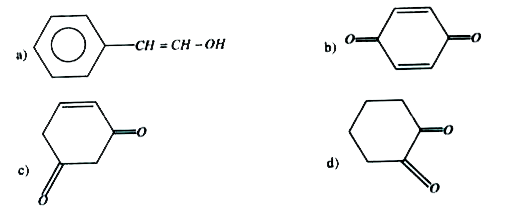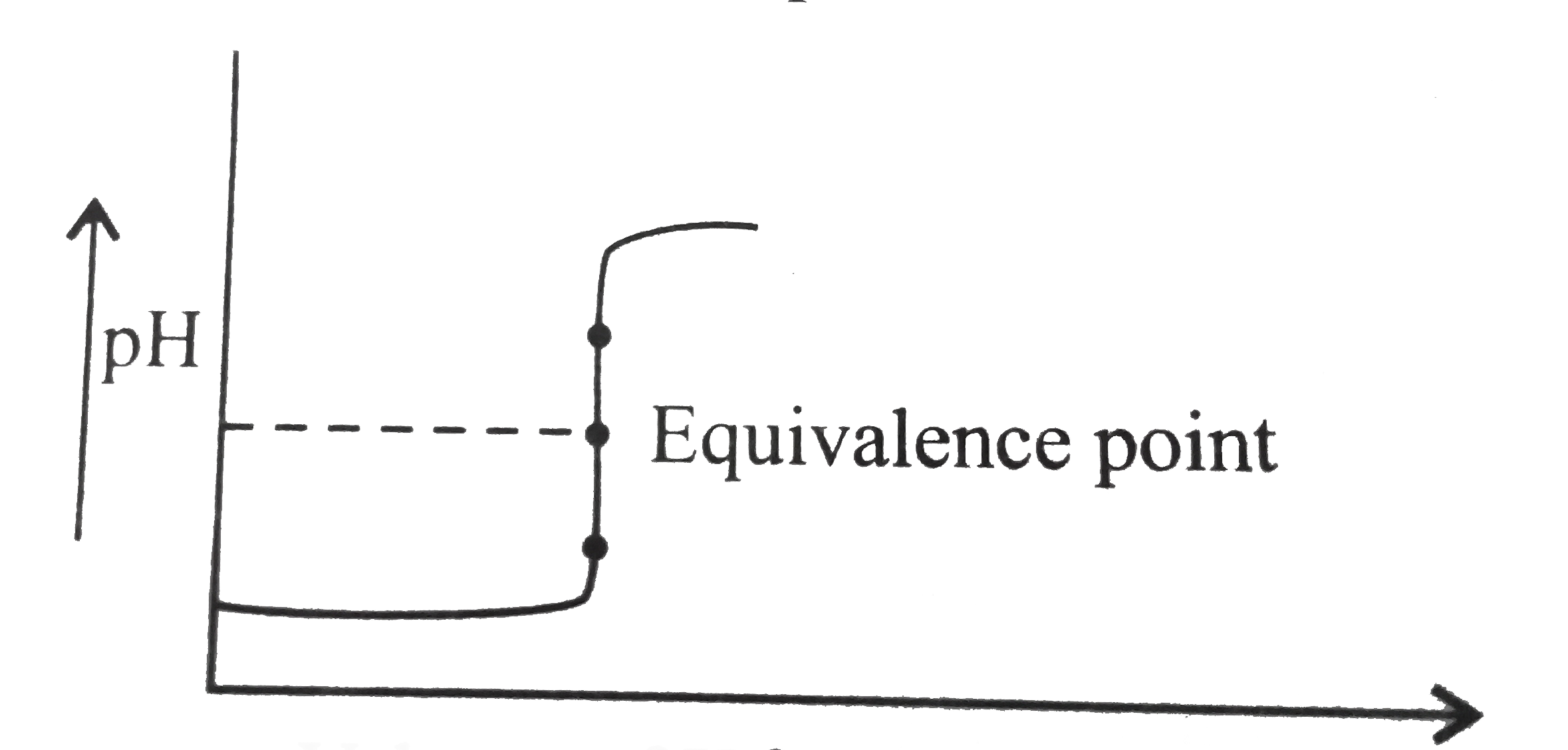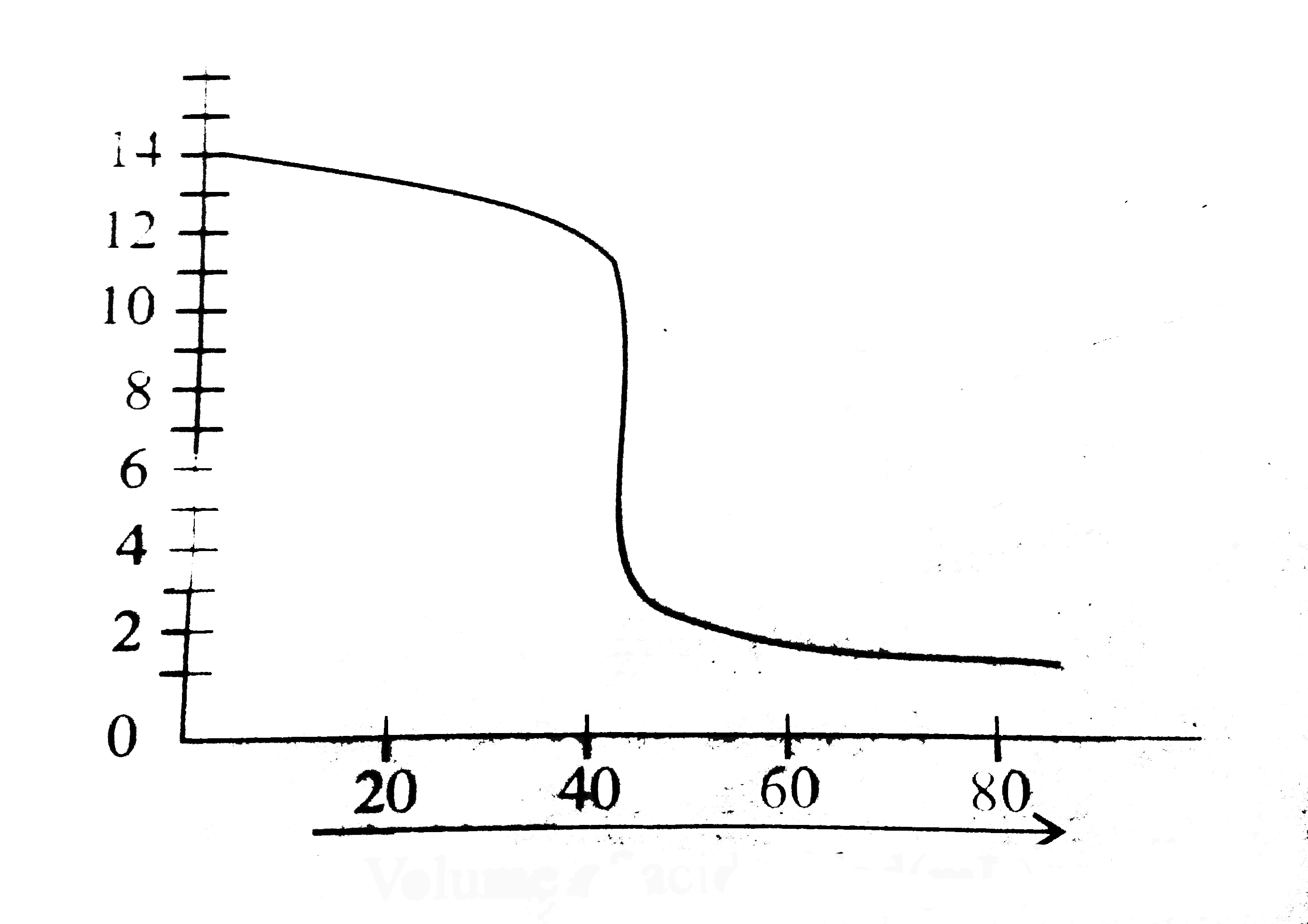An acid-base titration consists of the controlled addition of a dissolved base to a dissolved acid (or the reverse). Acid and base react rapidly to neutralize each other. At the equivalence point, equivalents of reacting substances are equal. The pH during a titration changes every time with a drop of titrant added, but the rate of this change varies enormously. A titration curve, graph of pH as a function of the volume of titrant, displays in detail how the pH changes over the course of an acid base titration. Significantly,the pH changes most rapidly near the equivalence point. The exact shape of a titration curve depends on the of acid and base.
Which of the titration could it represent? Solution in Telugu
The correct Answer is:B
It is a SB vs SA titration
Topper's Solved these Questions
- IONIC EQUILIBRIUM BOOK - AAKASH SERIESCHAPTER - IONIC EQUILIBRIUM EXERCISE - LECTURE SHEET (EXERCISE -IV LEVEL -II (ADVANCED) (Matrix Matching Type Questions))
4 Videos
- IONIC EQUILIBRIUM BOOK - AAKASH SERIESCHAPTER - IONIC EQUILIBRIUM EXERCISE - LECTURE SHEET (EXERCISE -IV LEVEL -II (ADVANCED) (Integer Type Questions))
18 Videos
- IONIC EQUILIBRIUM BOOK - AAKASH SERIESCHAPTER - IONIC EQUILIBRIUM EXERCISE - LECTURE SHEET (EXERCISE -IV LEVEL -II (ADVANCED) (More than One correct answer Type Questions))
14 Videos
- HYDROGEN AND ITS COMPOUNDSBOOK - AAKASH SERIESCHAPTER - HYDROGEN AND ITS COMPOUNDSEXERCISE - QUESTIONS FOR DESCRIPTIVE ANSWERS
20 Videos
- ISOMERISM BOOK - AAKASH SERIESCHAPTER - ISOMERISM EXERCISE - ADDITIONAL PRACTICE EXERCISE ( PRACTICE SHEET (ADVANCED) INTEGER TYPE QUESTIONS)
10 Videos
Similar Questions
Match the following columns

View SolutionCalculate the pH at which an acid indicator with Ka,=1.0×10−5 changes colour when the indicator concentration is 1.0×10−3 M
View SolutionAn acid -base indicator has a Kaof3.0×10−5 The acid form of the indicator is red and the basic form is blue. Then
View SolutionWhy the use of hard water is disadvantages?
View SolutionTautomerism is exhibited by X number of compounds among the following. What is X.

View SolutionIn acid-base titration react rapidly to neutralise each other. Equivalence point is a point at which the acid and the base (or oxidising agent and reducing agent) have beem added in equivalent quantities. The end point in the point at which the titration stops. since the purpose of the indicator is to stop the titration close to the point at which the acid and base were added in equivalent quantities, it is important that the equivalent point and the end point be as close as must change colour at a pH close to that of a solution of the salt of the acid base. Singificantly, the pH changes most rapidly near the equivalent point. The exact shape of a titration curve depends on Ka and Kb of acid and base.

The following curve represents titration curve of HCI against KOH. The pH at equivalent point is
Examine the titration curve below and answer the question.

View SolutionIn acid-base titration react rapidly to neutralise each other. Equivalence point is a point at which the acid and the base (or oxidising agent and reducing agent) have beem added in equivalent quantities. The end point in the point at which the titration stops. since the purpose of the indicator is to stop the titration close to the point at which the acid and base were added in equivalent quantities, it is important that the equivalent point and the end point be as close as must change colour at a pH close to that of a solution of the salt of the acid base. Singificantly, the pH changes most rapidly near the equivalent point. The exact shape of a titration curve depends on K_(a) and K_(b) of acid and base. The curve represents the titration of
View SolutionIn acid-base titration react rapidly to neutralise each other. Equivalence point is a point at which the acid and the base (or oxidising agent and reducing agent) have beem added in equivalent quantities. The end point in the point at which the titration stops. since the purpose of the indicator is to stop the titration close to the point at which the acid and base were added in equivalent quantities, it is important that the equivalent point and the end point be as close as must change colour at a pH close to that of a solution of the salt of the acid base. Singificantly, the pH changes most rapidly near the equivalent point. The exact shape of a titration curve depends on K_(a) and K_(b) of acid and base. The suitable indicator for the titration is
View SolutionIn acid-base titration react rapidly to neutralise each other. Equivalence point is a point at which the acid and the base (or oxidising agent and reducing agent) have beem added in equivalent quantities. The end point in the point at which the titration stops. since the purpose of the indicator is to stop the titration close to the point at which the acid and base were added in equivalent quantities, it is important that the equivalent point and the end point be as close as must change colour at a pH close to that of a solution of the salt of the acid base. Singificantly, the pH changes most rapidly near the equivalent point. The exact shape of a titration curve depends on K_(a) and K_(b) of acid and base. The pH at equivalence point is
View SolutionAt half - equivalence point in the titration of weak acid by a strong base , pH = …………..
View SolutionAn acid-base titration consists of the controlled addition of a dissolved base to a dissolved acid (or the reverse). Acid and base react rapidly to neutralize each other. At the equivalence point, equivalents of reacting substances are equal. The pH during a titration changes every time with a drop of titrant added, but the rate of this change varies enormously. A titration curve, graph of pH as a function of the volume of titrant, displays in detail how the pH changes over the course of an acid base titration. Significantly. the pH changes most rapidly near the equivalence point. The exact shape of a titration curve depends on the KaandKb of acid and base
The suitable indicator for this titration will be:
View SolutionAn acid-base titration consists of the controlled addition of a dissolved base to a dissolved acid (or the reverse). Acid and base react rapidly to neutralize each other. At the equivalence point, equivalents of reacting substances are equal. The pH during a titration changes every time with a drop of titrant added, but the rate of this change varies enormously. A titration curve, graph of pH as a function of the volume of titrant, displays in detail how the pH changes over the course of an acid base titration. Significantly. the pH changes most rapidly near the equivalence point. The exact shape of a titration curve depends on the KaandKb of acid and base
The pH at equivalence point is:
View SolutionAn acid-base titration consists of the controlled addition of a dissolved base to a dissolved acid (or the reverse). Acid and base react rapidly to neutralize each other. At the equivalence point, equivalents of reacting substances are equal. The pH during a titration changes every time with a drop of titrant added, but the rate of this change varies enormously. A titration curve, graph of pH as a function of the volume of titrant, displays in detail how the pH changes over the course of an acid base titration. Significantly,the pH changes most rapidly near the equivalence point. The exact shape of a titration curve depends on the K_a and K_b, of acid and base. < The suitable indicator for this titration will be :
View SolutionAn acid-base titration consists of the controlled addition of a dissolved base to a dissolved acid (or the reverse). Acid and base react rapidly to neutralize each other. At the equivalence point, equivalents of reacting substances are equal. The pH during a titration changes every time with a drop of titrant added, but the rate of this change varies enormously. A titration curve, graph of pH as a function of the volume of titrant, displays in detail how the pH changes over the course of an acid base titration. Significantly. the pH changes most rapidly near the equivalence point. The exact shape of a titration curve depends on the KaandKb of acid and base
The pH at equivalence point is:
View SolutionAn acid-base titration consists of the controlled addition of a dissolved base to a dissolved acid (or the reverse). Acid and base react rapidly to neutralize each other. At the equivalence point, equivalents of reacting substances are equal. The pH during a titration changes every time with a drop of titrant added, but the rate of this change varies enormously. A titration curve, graph of pH as a function of the volume of titrant, displays in detail how the pH changes over the course of an acid base titration. Significantly. the pH changes most rapidly near the equivalence point. The exact shape of a titration curve depends on the KaandKb of acid and base
The pH at equivalence point is:
View Solution
